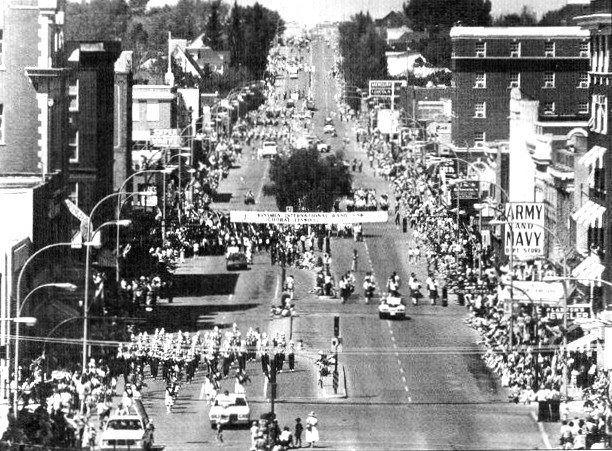MOOSE JAW — From modest beginnings in 1950 to its 73rd year this spring, the Moose Jaw Band and Choral Festival has orchestrated a symphony of memories, milestones, and melodies that resonate through generations.
A humble overture
The festival's inception traces back to 1949 when the Moose Jaw Chamber of Commerce envisioned a band contest to unite regional talents.
By May 20, 1950, this vision materialized with 11 bands from Saskatchewan and Montana, U.S., performing at the former exhibition grounds, now the site of the Town 'N' Country Mall. Initially termed a "band contest," the event emphasized competition, awarding marks, trophies, and medals to participants.
Percy Ferguson, chairman of the Kinsmen International Band Competition committee, recalled the festival's early days, noting the Kinsmen Club's pivotal role in nurturing the event. The club’s commitment attracted esteemed adjudicators such as Dr. George Seuffert and Leona May Smith, elevating the festival's prestige.
Marching through milestones
The festival's evolution mirrored a growing enthusiasm from the community. In 1959, bands had the honour of "baptizing" the newly built Civic Centre, affectionately known as the "Crushed Can," marking a significant chapter in Moose Jaw. Two features of the 1959 Kinsmen Band Contest were the first entertainment to be featured at the centre, aside from one earlier junior hockey game.
The 1967 centennial celebrations featured Bobby Gimby, Canada's "Pied Piper," who famously halted traffic at the intersection of Main Street North and Fairford Street, serenading the city with his trumpet and the iconic "Ca-na-da" song.
The ‘70s witnessed an expansion of the festival, notably in 1976 with the introduction of choral competitions. This addition was bolstered by a $10,000 (approximately $58,500 in 2025 CAD) sponsorship from Kentucky Fried Chicken, culminating in a memorable appearance by Colonel Harland Sanders himself.
Crescendos and challenges
The 1980s marked the festival's zenith. In 1982, approximately 20,000 spectators lined Main Street North to witness a parade featuring over 60 bands, including international participants. The festival's reputation solidified Moose Jaw's moniker as "The Band City."
However, the ‘90s brought challenges. By 1994, dwindling participation and organizational hurdles threatened the festival's continuity. The Kinsmen Club, after decades of stewardship, passed the baton to a dedicated group of citizens determined to preserve the festival's legacy.
Janie Fries, current chair of the festival committee, reflected on this transition in an earlier interview, stating that if Russ McKnight hadn't stepped forward to lead the festival in 1994, that could have been the event's last year.
Adapting to the times
Recognizing a shift in the festival’s dynamics, organizers transitioned from a competitive to an educational focus. This shift emphasized adjudicated performances, with the goal of providing constructive feedback to budding musicians.
The early 2000s saw further adaptations. To accommodate participants' schedules, events moved from the traditional May long weekend to midweek. Venues diversified, with performances held at locations including Crescent Park Amphitheatre and St. Andrew's United Church in 2019.
The COVID-19 pandemic posed unprecedented challenges and led to the festival's temporary pause from 2020 to 2022. Yet, resilience prevailed. In 2023, the festival returned with renewed vigour, introducing "Party in the Park," a dance event in Crescent Park that drew over 800 enthusiastic participants and featured Moose Jaw’s own “The Bromantics.”
A harmonious future
In 2025, the festival celebrated its 73rd iteration, welcoming over 110 groups and approximately 4,500 students. This resurgence confirmed the festival's enduring relevance.
The Canadian Band Association recognized the festival's contributions by awarding it the Community Builders Award. Suzanne Gorman, CEO of the Saskatchewan Band Association, lauded the festival's commitment to fostering community and musical excellence.
Reflecting on the festival's journey, Fries remarked, "I'm really glad that it's still going… and that it has evolved and changed with the times to help keep it viable… The festival clinics improve music education across the Prairie provinces, which is a very excellent result.”
From humble beginnings to its current stature, the Moose Jaw Band and Choral Festival stands as a testament to community spirit, adaptability, and the unifying power of music.
To learn more about the Moose Jaw Band and Choral Festival, visit MJBandAndChoral.org or the Moose Jaw Public Library archives.




